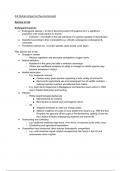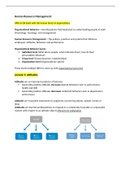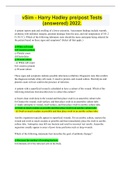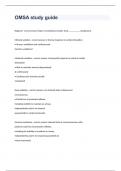Species at risk
Endangered species
● Endangered species = at risk of becoming extinct throughout all or a significant
proportion of its range (where it’s found)
○ Extinction = the death of the last individual of a species capable of reproduction
● Classified according to their vulnerability e.g. critically endangered, endangered &
vulnerable
● Threatened species inc. mountain gorillas, giant panda, polar bears
Why species are at risk
● Change in climate
○ Reduce vegetation and decrease atmospheric oxygen levels
● Natural selection
○ Mutations in the gene pool offer a selective advantage
○ If there are insufficient mutations to adapt to changes in habitat species may
become threatened / extinct
● Habitat destruction
○ E.g. hedgerow removal
■ Contain many plant species supporting a wide variety of animal life
■ Removal for agricultural use and subsequent loss of wildlife corridors ⇾
reduced species numbers and affected food chains
○ E.g. Dodo birds indigenous to Madagascar and Mauritius went extinct in 1662
due to habitat destruction and hunting
● Pollution
○ PCBs (polychlorinated biphenyls)
■ Manufactured as coolants
■ Banned due to toxicity and carcinogenic nature
○ Oil
■ Shipped worldwide to meet our energy needs
■ Millions of gallons of crude oil have leaked into oceans e.g. 1996 the Sea
Empress ran aground off the coast of Pembrokeshire, spilling oil into the
the Cleddau Estuary endangering seabirds and marine life
● Overhunting and collecting
○ e.g. traditional medicine (tiger bone, rhino horn), ornaments (turtle shell, ivory)
○ Overfishing and agricultural exploitation
● Competition from introduced /alien species (interspecific competition)
○ e.g. north American signal crayfish escaped from fish farms in the UK and
outcompete native crayfish
, Conservation
● The protection, preservation, management and restoration of natural habitats and their
ecological communities
○ In situ - conservation methods in the animals habitat
○ Ex situ - removal of animals from their habitat for breeding programmes then
reintroducing them
● Important because;
○ Ethical reasons - we have a responsibility to preserve the environment
○ Possible medical uses - many drugs have been extracted from plants e.g. some
chemotherapy drugs, quinine from Cinchona bark used to treat malaria, many yet
to be discovered
○ Aims to maintain species and genetic biodiversity
■ Maintaining a healthy gene pool helps protect populations from
environmental changes
■ Alleles that provide a selective advantage will prevent species from going
extinct
○ Agriculture has selectively bred crops from wild varieties, in the future we may
need to select suitable alleles to grow crops in harsher environments
Conservation methods
● Legislation
○ Convention on International Trade in Endangered Species (CITES) agreement
■ Can't legally trade endangered species
■ Enforced by; strict custom controls, fines, jail sentences
■ Difficult to enforce; not all countries have signed up, difficult to police
○ EU Habitats Directive
■ Prevents collection of some birds’ eggs, reduces picking of wildflowers,
reduce overfishing
○ Establish protected areas
■ Sites of Special Scientific Interest (SSSIs)
■ Nature reserves e.g. Gower coast
● Captive breeding programmes
○ Seed banks - hold seeds from rare / traditional / economically important varieties
in controlled environments to protects against extinction of species e.g. Kew
Gardens
○ Sperm banks - store sperm from threatened species & use in captive breeding to
ensure genetic variety within populations
○ Reintroduce species to the wild following captive breeding programmes
■ E.g. red kite was reintroduced to mid-Wales
● Education
○ Raise awareness to problems affecting conservation
■ E.g. WWF & the Countryside Commission (CC also establish nature
reserves)






